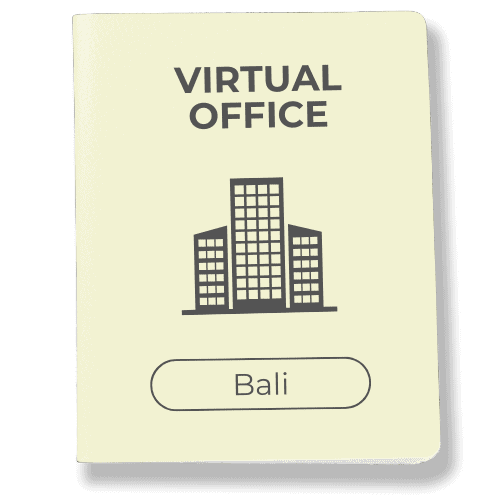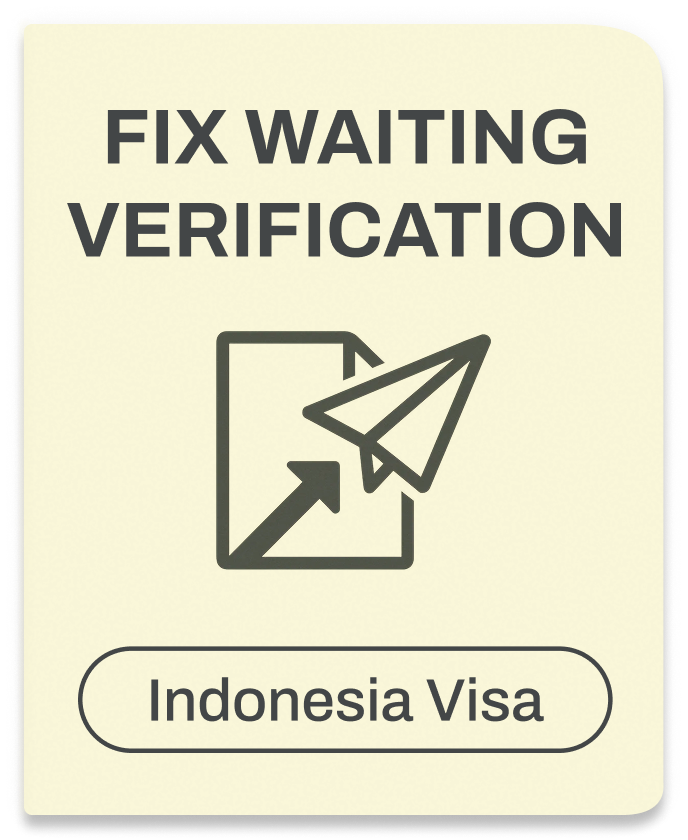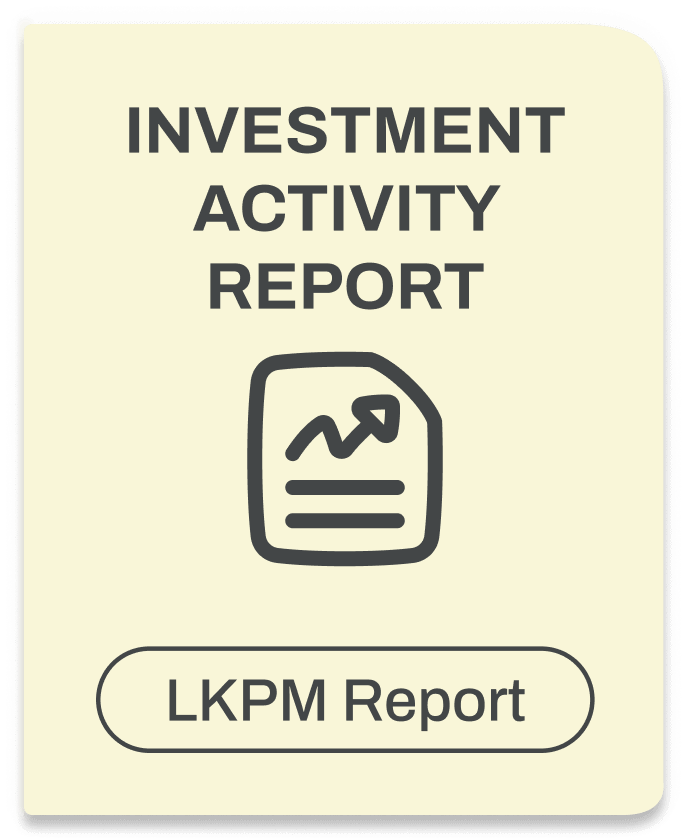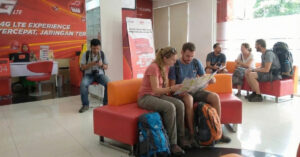How to Become a Digital Nomad in Bali: A Complete Guide

Ready to trade your office cubicle for beachside cafés and rice paddies? Bali has become the holy grail for digital nomads, making it one of the most popular destinations for remote workers, and for good reason. But, becoming a successful nomad isn’t just about booking a flight and hoping for the best.
This guide breaks down everything you need to know to make your Bali nomad dream actually work. Bali is a prime example of the digital nomad lifestyle, offering unique living conditions, vibrant coworking spaces, and a supportive community for remote workers. We’re talking real deadlines, actual costs, and the kind of practical stuff that’ll save you from rookie mistakes.
With more people coming to Bali every year for remote work and adventure, understanding the essentials is more important than ever.
What Makes Bali Popular for Digital Nomads?
So, what makes Bali such a magnet for digital nomads and remote workers? For starters, the island’s gorgeous beaches, lush rice terraces, and vibrant culture create a backdrop that’s hard to beat. But it’s not just about the scenery; Bali’s cost of living is surprisingly affordable, especially compared to other popular destinations for digital nomads.
Bali is packed with many coworking spaces and coffee shops, from the city center to the coast, all designed to help you stay productive and inspired. The local community is famously welcoming, and you’ll find it easy to connect with both locals and fellow expats. English is widely spoken, so getting around and making friends is a breeze.
Whether you want to work from a bustling coworking space, a quiet café, or your own villa, Bali has options for every style and budget. The island’s infrastructure is well-developed for remote work, and you’ll find everything you need to make living and working here comfortable and enjoyable. Simply put, Bali offers the perfect mix of work, play, and community, making it a favorite place for digital nomads from around the world.
Your First 30 Days: The Make-or-Break Playbook

Think of your first month as a digital nomad boot camp. Get these basics right, and you’ll set yourself up for months of smooth sailing. Mess them up, and you’ll spend way too much time dealing with admin headaches instead of living your best life.
Health and money reality check
Review your budget and make sure you have enough to cover at least two months of living expenses. It’s also important to open a local bank account for receiving payments and managing your expenses in Indonesia. Many digital nomads get paid through foreign accounts, so be sure you understand how international payments work and how to access your funds locally. Take time to research the legal framework around remote work and income in Indonesia, as regulations can affect how you are allowed to work and get paid.
Week 1 (Days 1-7): Get Connected and Legal
First, you need to be legally a remote worker in Indonesia. The only visa for legal remote work is the Digital Nomad or Remote Worker visa (E33G), which is specifically designed for people who work remotely for companies or clients outside of Indonesia.
Don’t risk it with a tourist visa or any other visa type. The Indonesian government is cracking down on “fake tourists” who are actually working remotely.
The Digital Nomad visa is valid for up to one year and gives you multiple entry privileges, meaning you can leave and come back to Indonesia freely during that time. It also opens doors that tourist visas can’t; you’ll be able to open a local bank account, get an Indonesian driver’s license, and lease property legally.
Another thing to work on is sim cards. It is essential for digital nomads in Bali, as they provide reliable internet access for remote work, navigation, and staying connected while on the move.
But here’s the thing: Before you can use your SIM card, you have to register your phone’s IMEI number. If you don’t, your mobile data access will be automatically blocked in 90 days.
So, IMEI is your phone’s unique ID number, and Indonesia requires you to register it with customs if you plan to use it for more than a few months. You’ve got 60 days from when you arrive to register with Bea Cukai (Indonesia’s customs office), but only if you didn’t do it at the airport when you landed.
Pro tip: Complete this registration right away. It costs around $10-15, and skipping it will block your phone from Indonesian networks, not exactly the digital nomad vibe you’re going for.
Week 2 (Days 8-14): Test Drive Your Work Life
Time to road-test those coworking spaces
Don’t commit to a monthly membership anywhere yet. Instead, buy day passes at 3-4 different coworking spaces. Co-working spaces in Bali are designed to meet the needs of the modern remote worker, offering modern amenities, community engagement, and opportunities for networking. As a remote worker, finding the right workspace is crucial for productivity. You’re looking for reliable wifi, quiet phone booths for calls, and a vibe that matches how you work best.
Get your scooter situation figured out
In Bali, a scooter isn’t just convenient, it’s pretty much essential. You’ll need to get a local license (called SIM C) and learn the basic safety rules. This isn’t just about avoiding fines (though those are real). It’s about not becoming a statistic.
Take a quick safety course if you’ve never ridden before. Trust me, Bali traffic is its own beast.
Week 3 (Days 15-21): Lock Down Your Living Situation
Do your housing homework
This is where many nomads mess up. They fall in love with the first Instagrammable villa they see and sign a lease without checking the basics.
Here’s your due diligence checklist:
- Test the internet speed at different times of day (not just once)
- Ask about noise levels and local ceremonies (some can be loud and last all night)
- Understand banjar fees, these are local community contributions, usually $5-20 per month
- Get a backup internet solution (mobile hotspot or secondary provider)
Co living spaces are also a popular choice for digital nomads in Canggu, offering community and convenience alongside flexible housing options.
Lease norms to know: Most places want 1-2 months upfront, and haggling is normal for stays over 3 months.
Week 4 (Days 22-30): Cover Your Bases
Health and money reality check
Get basic health insurance sorted and locate the nearest international clinic. Also, this is a good time to review your first month’s spending and adjust your budget based on reality, not Instagram expectations.
Set up your visa extension reminders
Put alerts in your phone for visa renewals. Missing these deadlines can turn into expensive headaches real quick.
Where to Live: Pick Your Bali Personality

Bali isn’t just one place; it’s like five different countries rolled into one island. Your choice of neighborhood will make or break your nomad experience. Here’s the real deal on each area:
| Location | Vibe | Monthly Rent (USD) | Commute/Transport | Coworking Options | Typical Internet Speed |
| Canggu/Berawa | Networking hub, beach cafés, young crowd. In recent years, Canggu has become a great place for networking and socializing, with a surge in popularity among digital nomads. | $300–800 | Scooter essential, traffic jams | 10+ spaces, very social | 25–50 Mbps |
| Ubud | Focus mode, jungle vibes, wellness. Ubud is the perfect place for focus and relaxation. | $250–600 | Scooter needed, winding roads | 5+ spaces, quieter | 20–40 Mbps |
| Uluwatu | Surf culture, quieter, cliff views | $400–900 | Scooter a must, isolated | 3–4 spaces, chill vibe | 15–35 Mbps |
| Sanur | Family-friendly, local feel, calmer. Sanur is the perfect place for relaxation and a slower pace. | $300–700 | Easy scooter rides, less traffic | 2–3 spaces, professional | 20–45 Mbps |
| Seminyak | Upscale shopping, restaurants | $500–1200 | Walkable areas, traffic-heavy | 4–5 spaces, business-focused | 30–60 Mbps |
The active Bali expat community, especially in regions like Canggu, helps newcomers connect and settle in through social events and Facebook groups.
Real Cost of Living: Three Budget Levels
Let’s talk numbers. Here are three realistic budget scenarios that cover everything you actually need:
If you are living abroad in Bali, especially as an American, remember to factor in international expenses and potential tax obligations in your financial planning.
Lean Budget: $800-1000/month
- Rent: Shared villa or simple studio ($250-350)
- Scooter: Rental ($30-50) + fuel ($20)
- Food: Local warungs and cooking ($100-150)
- Coworking: Day passes or basic membership ($50-80)
- Mobile data: Unlimited plan ($10-15)
- Healthcare: Basic insurance + clinic buffer ($30-50)
- Miscellaneous: Transport, entertainment ($150-200)
Comfortable Budget: $1200-1600/month
- Rent: Private studio or 1BR with pool ($400-600)
- Scooter: Rental + fuel ($60)
- Food: Mix of local and Western food ($200-300)
- Coworking: Premium membership ($100-150)
- Mobile data: Unlimited + backup ($25)
- Healthcare: Good insurance + private clinics ($50-80)
- Miscellaneous: Activities, travel, dining out ($300-400)
Upgrade Budget: $2000-3000/month
- Rent: 2-3BR villa with staff/amenities ($800-1400)
- Transportation: Scooter + occasional car/driver ($120-200)
- Food: Restaurants, organic markets, variety ($400-600)
- Coworking: Multiple memberships or private office ($200-300)
- Internet: Primary + multiple backups ($50-80)
- Healthcare: Premium insurance + regular checkups ($100-150)
- Miscellaneous: Travel, activities, shopping ($600-800)
Reality check: Prices can swing 30-50% depending on season, location, and how well you negotiate. These numbers are based on 2024-2025 data from nomad communities and local sources.
Work Setup That Actually Matters

You’re not on vacation, you’re working from paradise. That means your setup needs to be bulletproof. Connecting with other digital nomads in shared workspaces can also enhance your experience and boost productivity.
Coworking Spaces: Your Shortlist
Not all coworking spaces are created equal. Here’s what to look for:
Must-haves:
- Quiet rooms or phone booths (for video calls)
- Backup generators (power cuts happen)
- 24/7 access or at least 12+ hour availability
- Decent coffee (you’ll need it)
- Air conditioning that works
Top-rated options by area:
- Canggu: Outpost, BWork, Tribal Bali
- Ubud: Outpost Ubud
- Seminyak: KOYA, The Workshop
- Sanur: Hubud Sanur
Note: Many coworking spaces require proof of a valid visit visa or passport for membership or day pass access.
Home Internet: Your Lifeline
This is where many nomads get burned. Indonesian internet can be great, or terrible, sometimes on the same day. Here’s your protection strategy:
Before signing any lease, demand:
- Screenshots of the router admin panel showing current speeds
- Recent speed test results (ask for tests from the last week)
- Information about the internet provider and plan type
- Backup options if the main connection fails
Reliable providers to look for:
- Indihome Fiber (government-owned, stable)
- Biznet (fast but not everywhere)
- First Media (good for urban areas)
Your backup plan: Get an unlimited mobile data plan from Telkomsel or XL. These work as decent hotspots when your main connection dies.
Productivity Hacks for Bali Nomads
Staying productive in paradise takes more than just good intentions. For digital nomads in Bali, the right environment is everything. Start by finding a coworking space that matches your work style, many coworking spaces in Bali offer fast internet speed, quiet zones, and even outdoor seating so you can soak up the sun while you work.
Establishing a daily routine is another game-changer. Mix in activities like yoga, surfing, or a morning walk to keep your energy up and your mind clear. Don’t underestimate the power of community. Join Facebook groups for digital nomads in Bali or attend local meetups to connect with other remote workers, swap tips, and stay motivated.
Leverage time-management apps to keep your tasks on track, and set clear boundaries between work and play. With so many coworking spaces and inspiring spots to choose from, you’ll find it easier to stay focused and make the most of your digital nomad life in Bali.
Getting Around, Safety & Local Etiquette
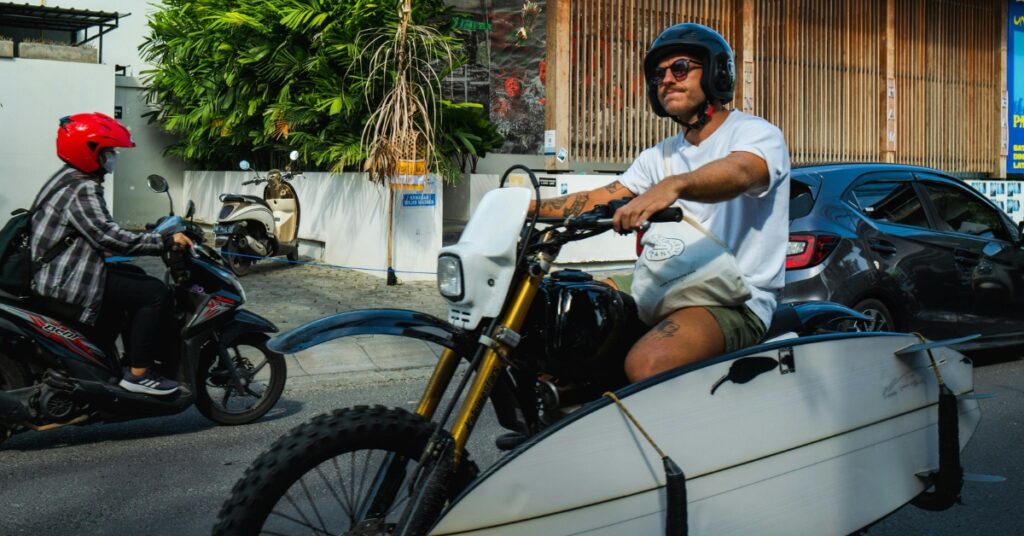
Scooter Life: Your New Reality
Getting legal: You need a SIM C license to ride legally. It takes about a day and costs around $15-20. Some places will rent to you without it, but police checkpoints are real, and fines start at $30.
Safety basics that matter:
- Always wear a helmet (it’s the law and could save your life)
- Avoid riding at night, especially after 10 PM
- Learn the local hand signals and road rules
- Never ride during heavy rain, Bali roads get slippery fast
When to hire a driver instead: Long distances, airport runs, carrying lots of stuff, or when you’ve been drinking. Apps like Gojek and Grab work well for this.
Cultural Basics: Don’t Be That Tourist
Respect local ceremonies: Balinese Hindu ceremonies happen regularly and can involve street closures, loud music, and processions. Don’t complain, these are sacred events that have happened for centuries.
Banjar community fees: Most neighborhoods have a local community association (banjar) that collects small monthly fees for local projects and ceremonies. Pay them cheerfully, it’s usually $5-20 and helps you stay on good terms with locals.
Waste and noise etiquette:
- Don’t burn trash (it’s illegal and creates toxic smoke)
- Keep music and voices down after 9 PM
- Learn basic Indonesian greetings; locals appreciate the effort
Coworking space manners:
- Book phone booths for calls longer than 5 minutes
- Don’t eat smelly foods in shared spaces
- Clean up after yourself in the kitchen areas
- Respect quiet zones and working hours
Staying Healthy
Living in Bali as a digital nomad is a dream, but keeping your health front and center is important. Make sure you have solid health insurance that covers you for emergencies, routine care, and even adventurous activities like scuba diving. Many coworking spaces in Bali are equipped with gyms or yoga studios, making it easy to stay active without leaving your workspace.
Bali is a haven for healthy food lovers, with plenty of restaurants offering vegan, vegetarian, and gluten-free options. Take advantage of the island’s natural beauty by getting outside, hiking, surfing, or simply exploring, which can do wonders for your physical and mental well-being.
Stay hydrated, eat well, and listen to your body. If you ever fall ill, Bali has reputable clinics and hospitals, but having health insurance will give you peace of mind. By prioritizing your health, you’ll be able to fully enjoy living in Bali as a digital nomad and keep your productivity and your sense of adventure at their peak.
Let’s Make It Work with Visa-Indonesia
Sorting out visas can be a headache, but it doesn’t have to be. At visa-indonesia.com, we’ve already helped 40,000+ people just like you get their Indonesian visa with minimum effort and zero guesswork.
From your application all the way to extension reminders, we handle everything A–Z, so you can spend less time worrying about paperwork and more time enjoying Bali.
👉 Get Your Digital Nomad Visa Now! and let us take care of the rest.
Ready to Apply or Extend Your Visa?
Let our visa specialists handle your application.








